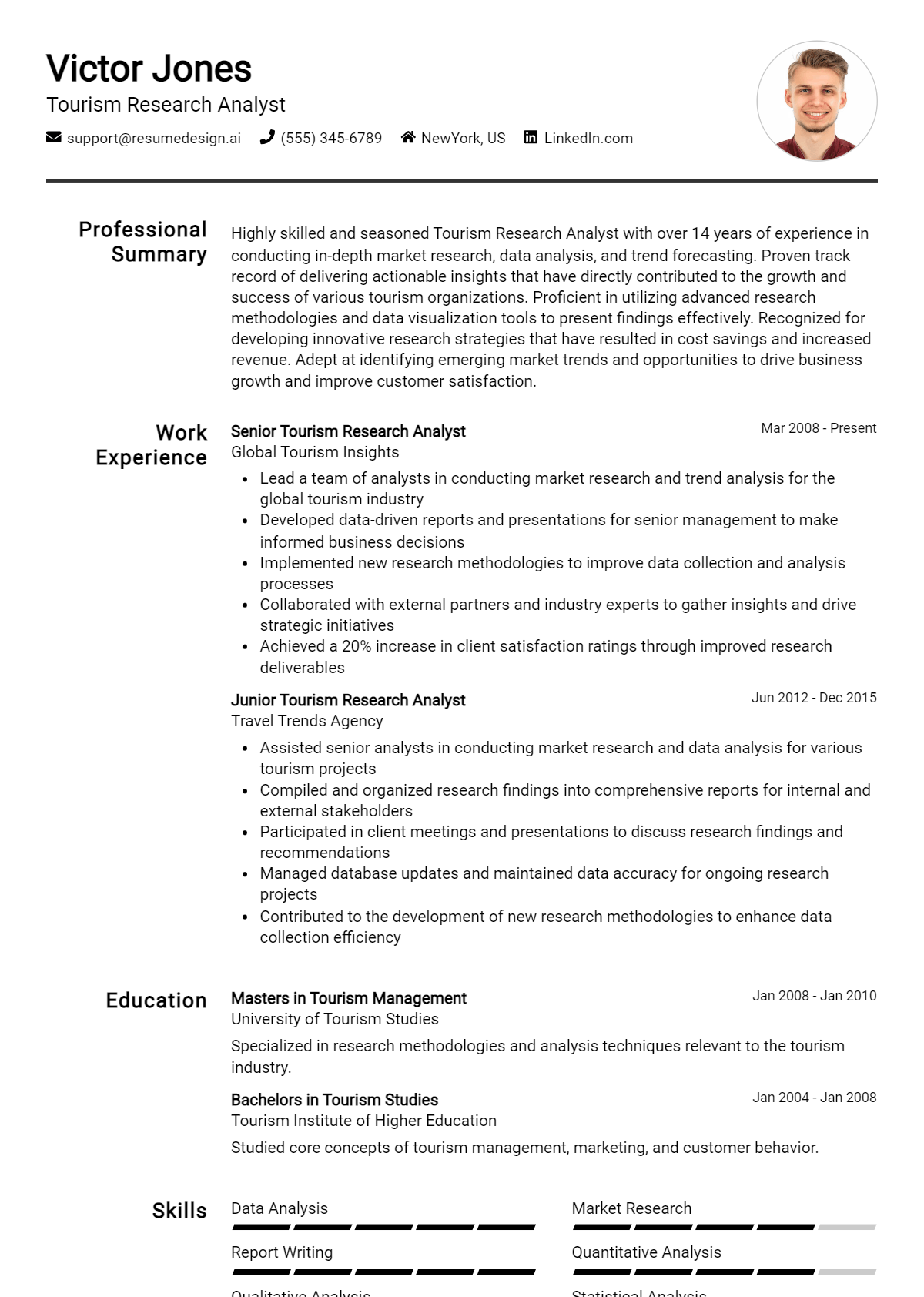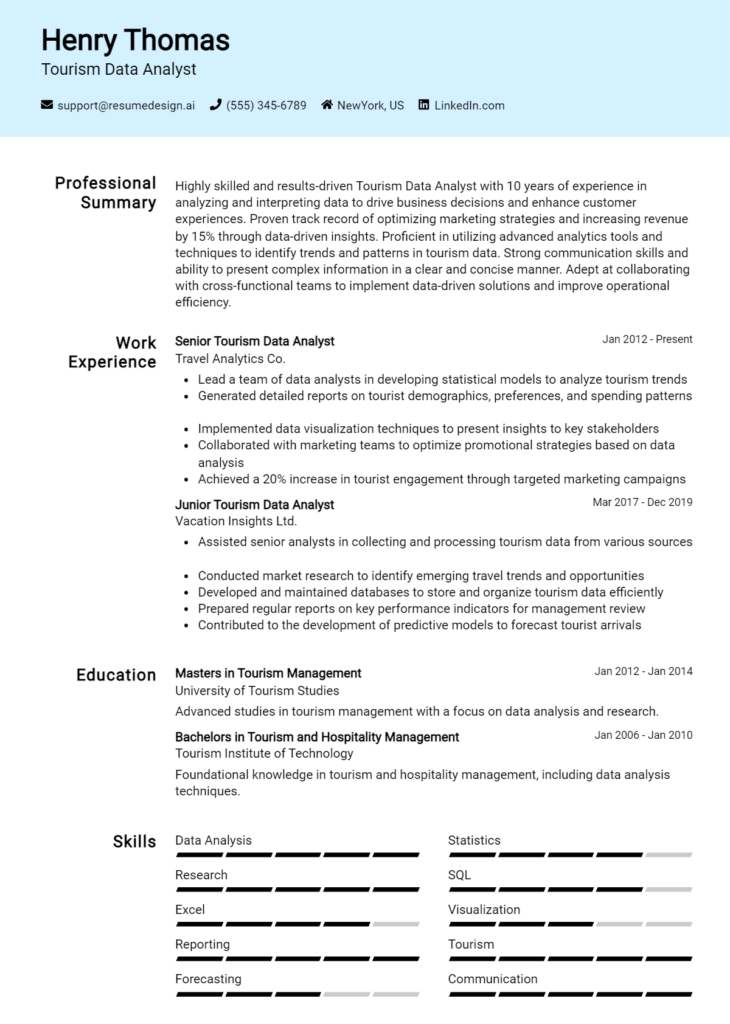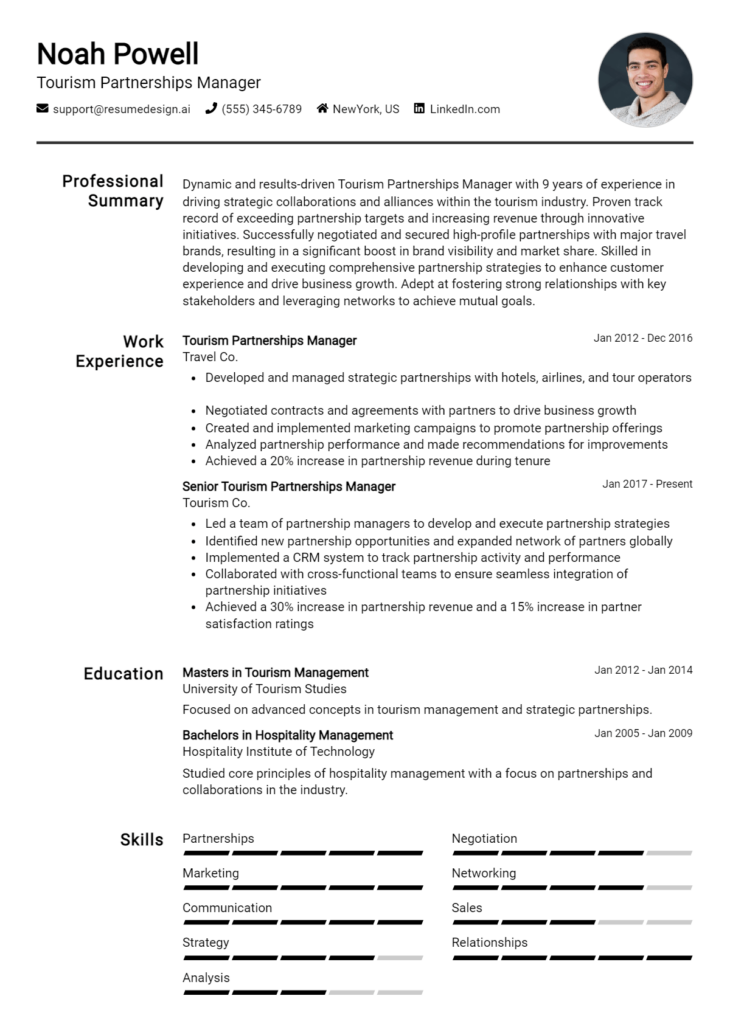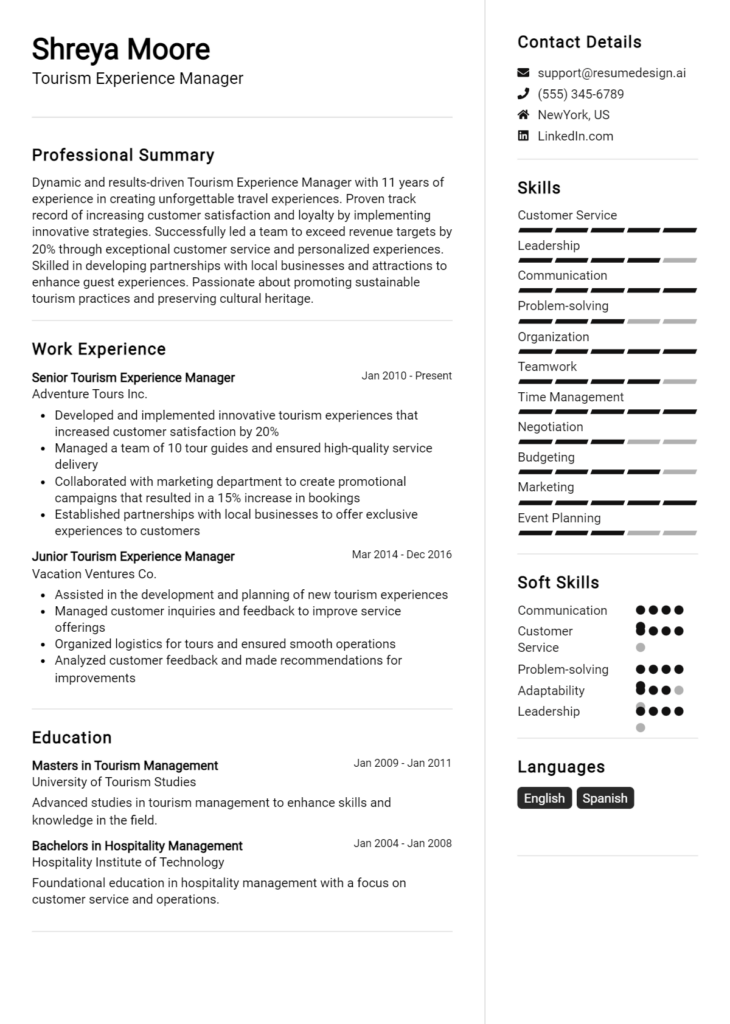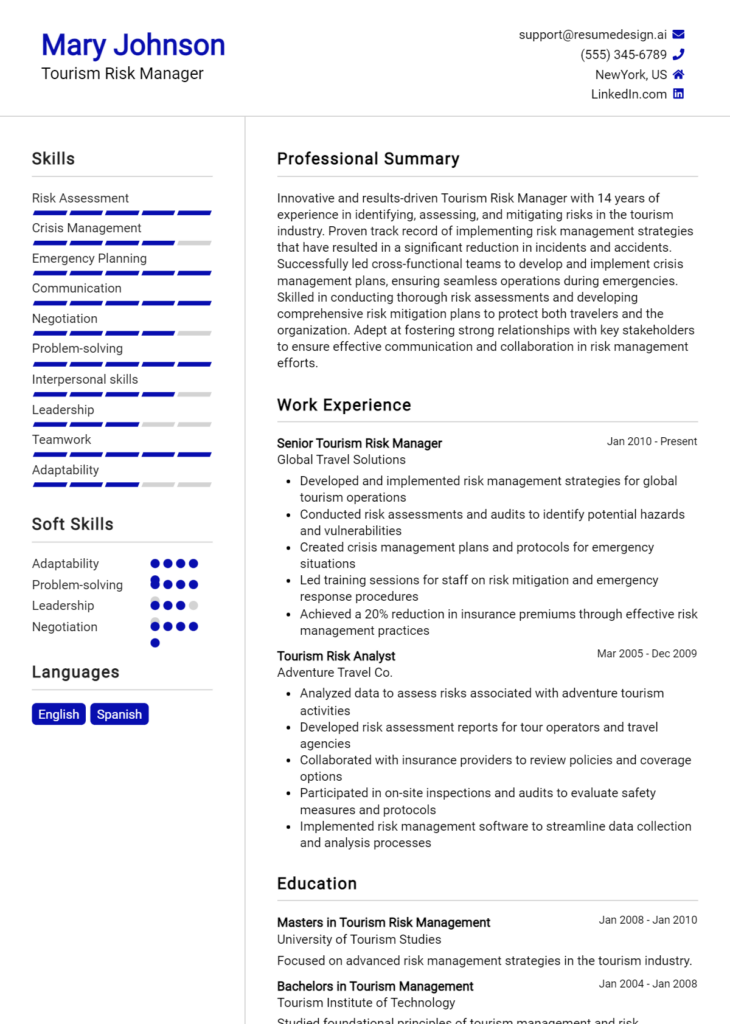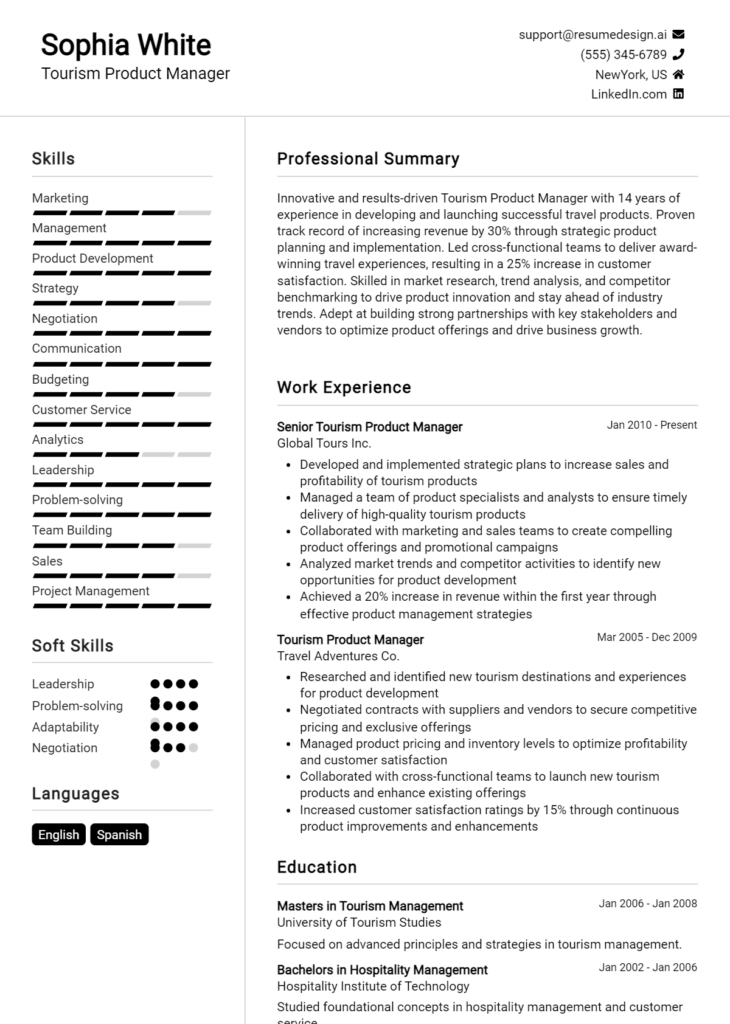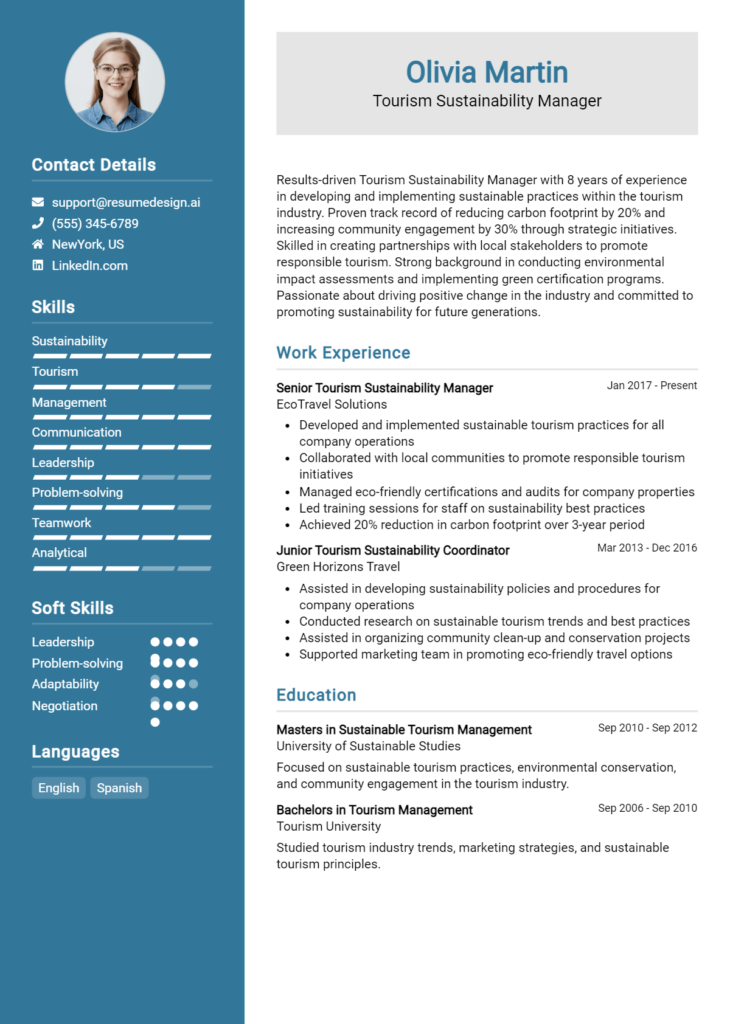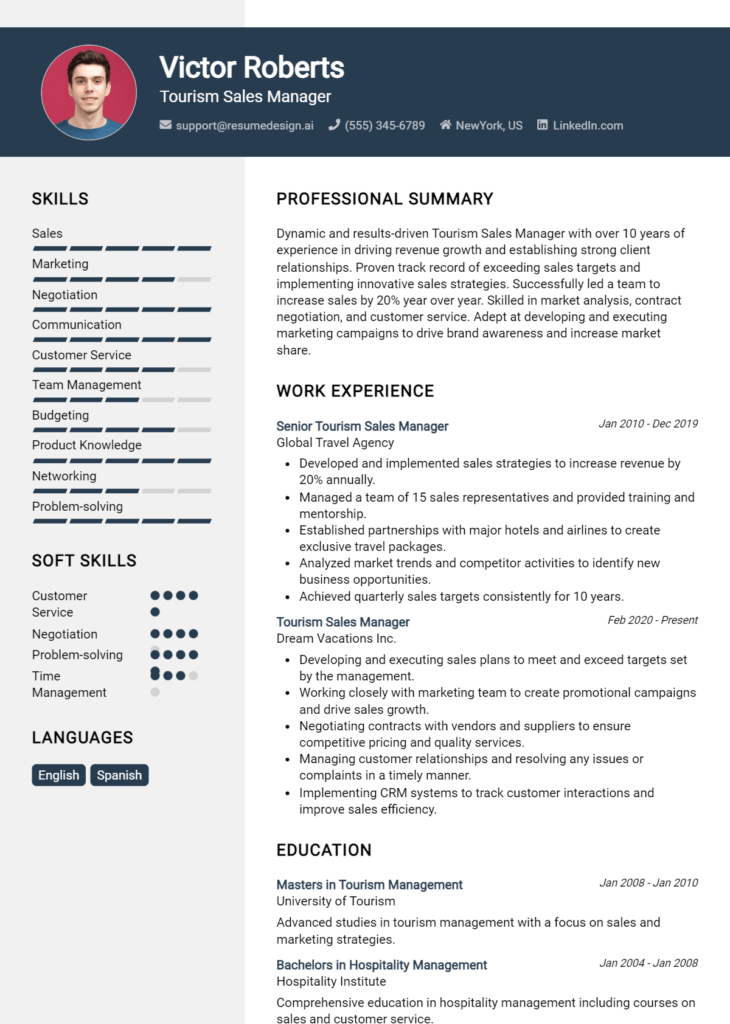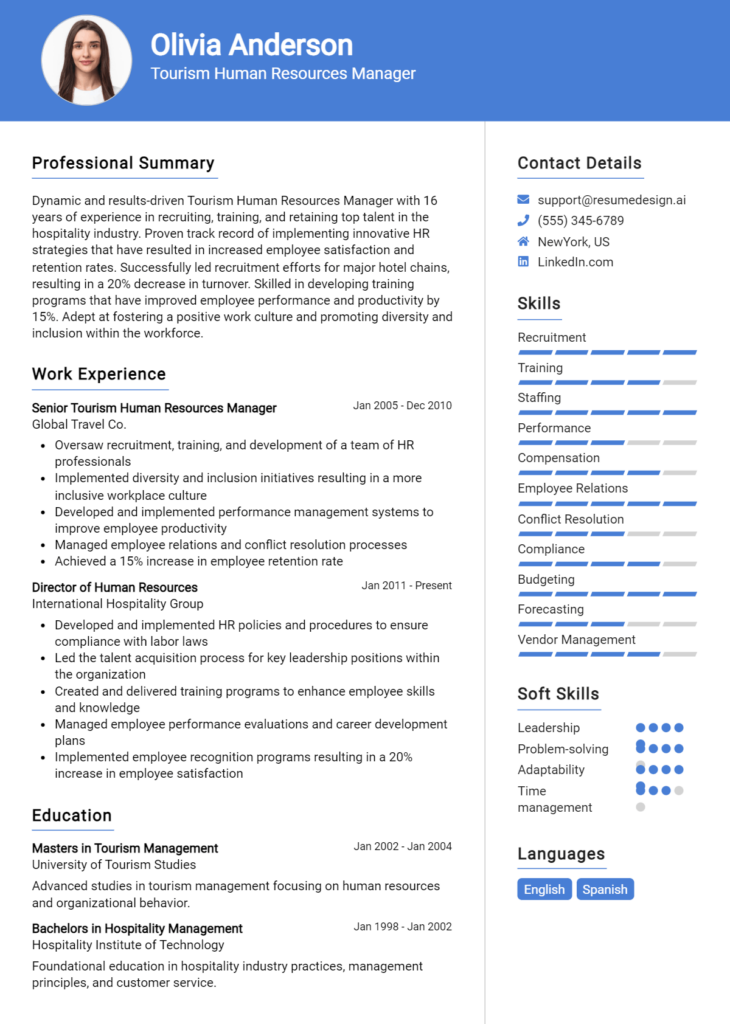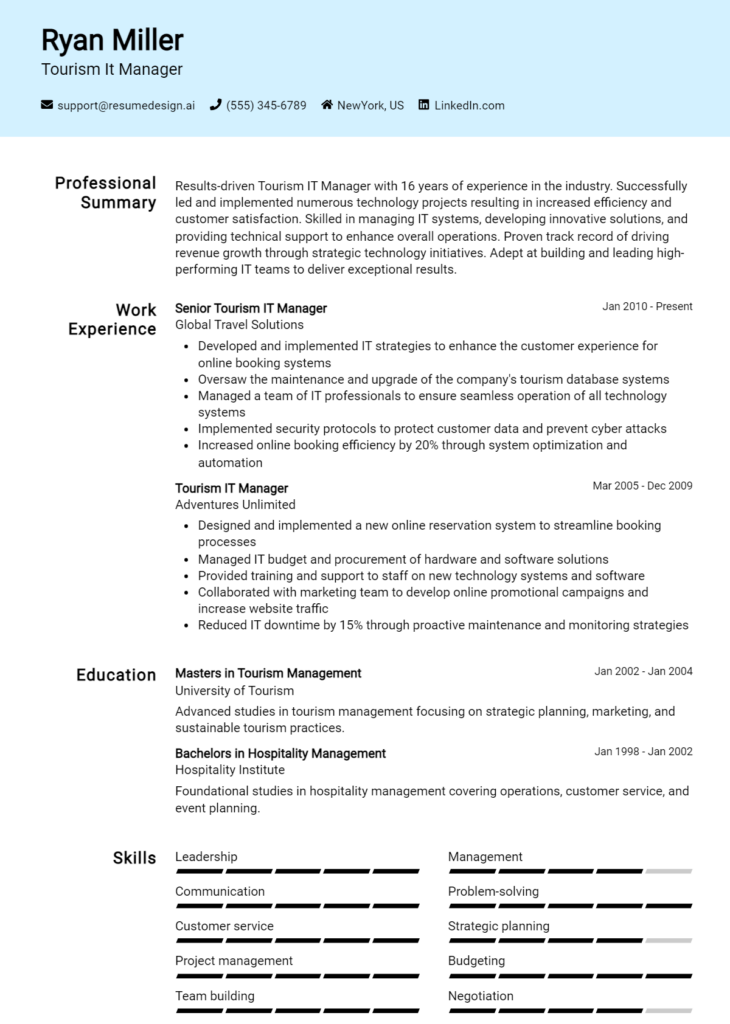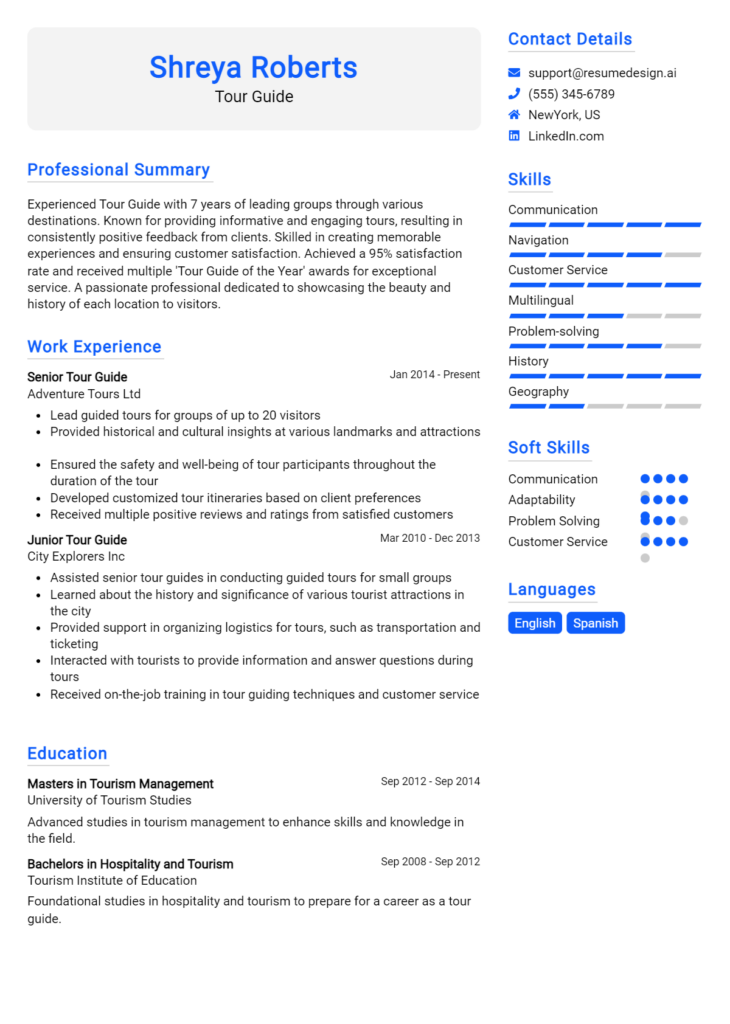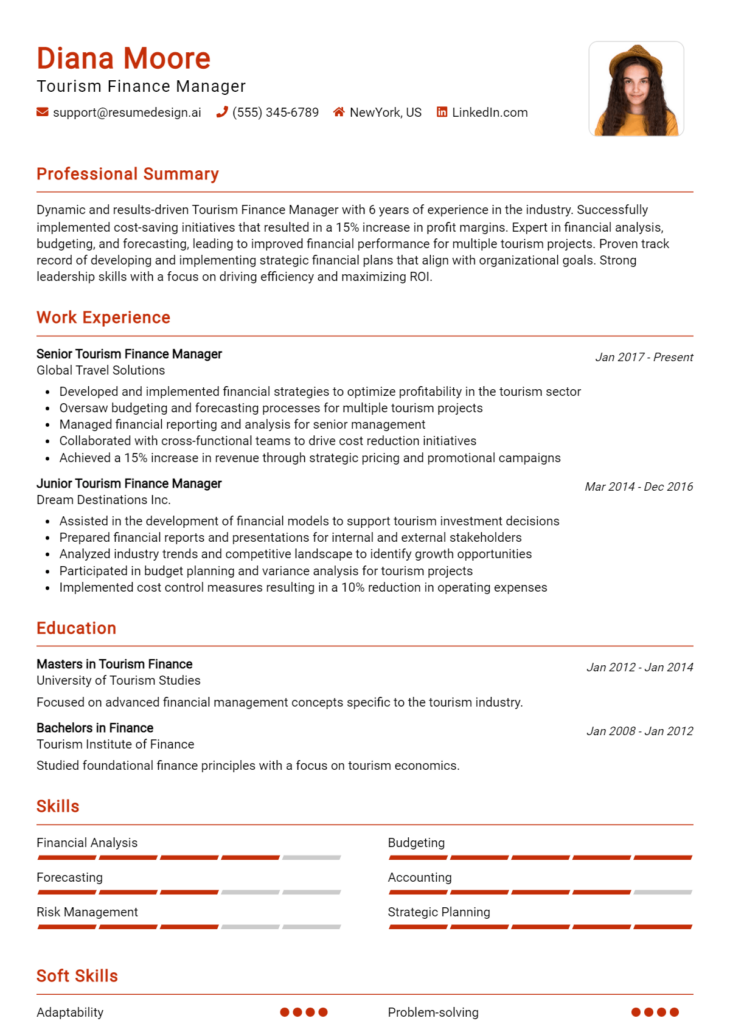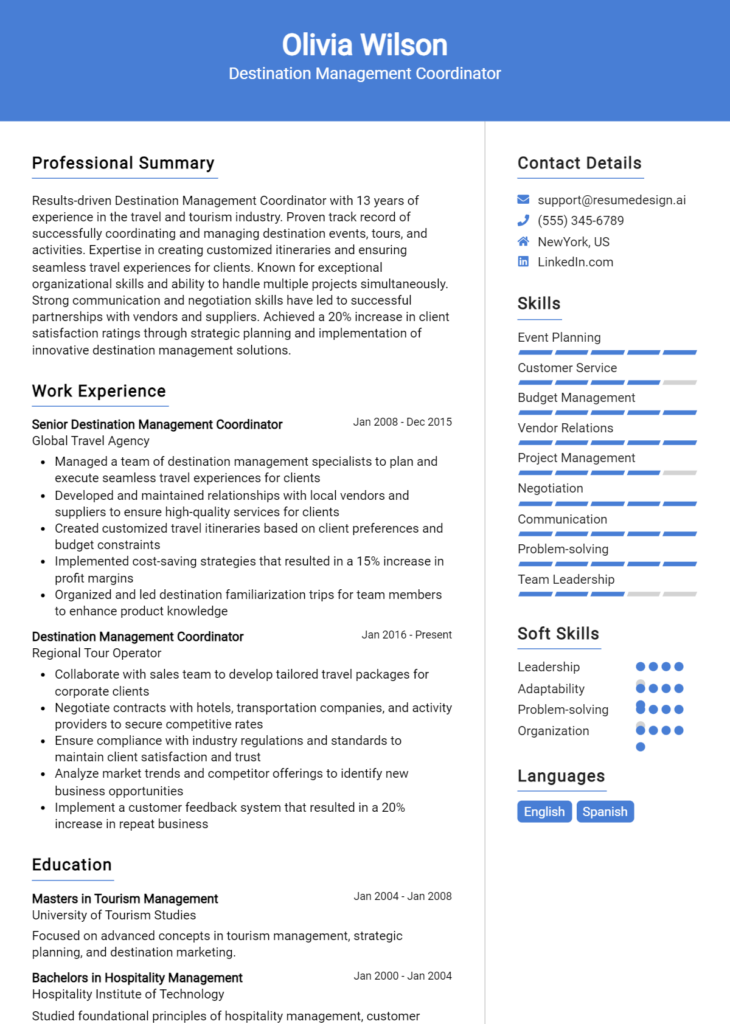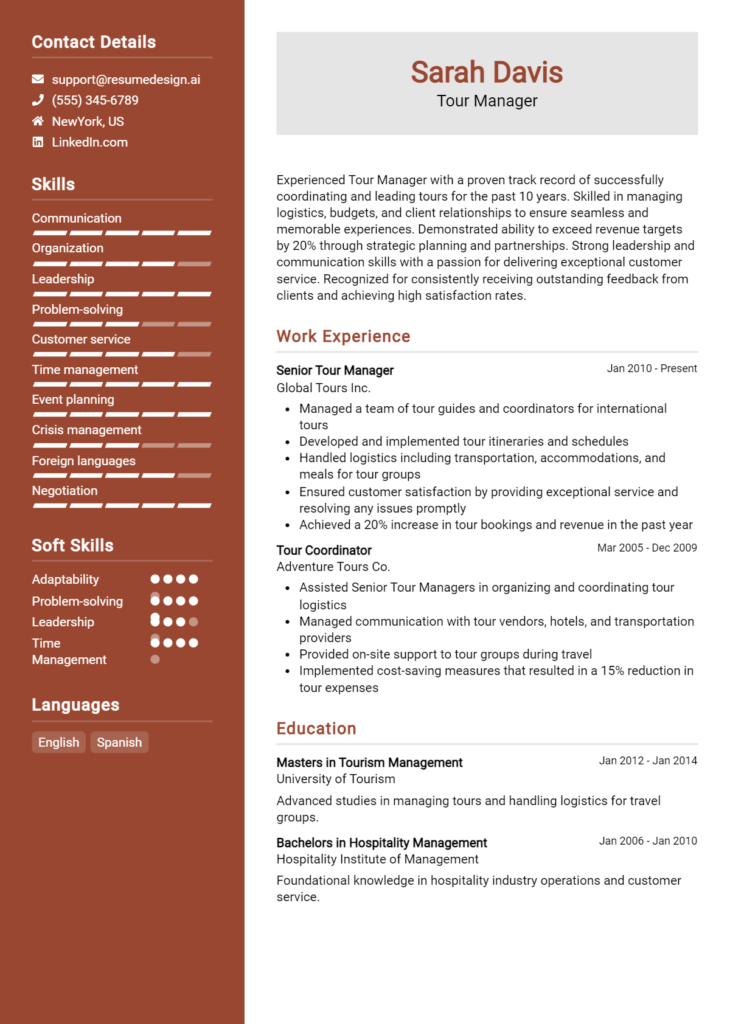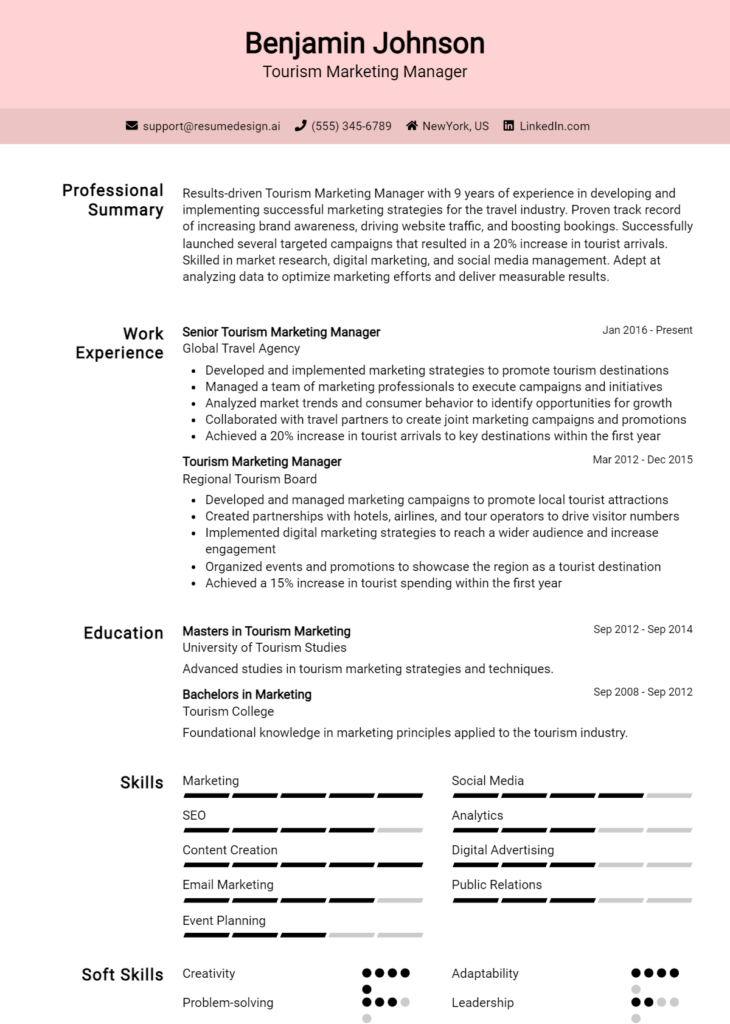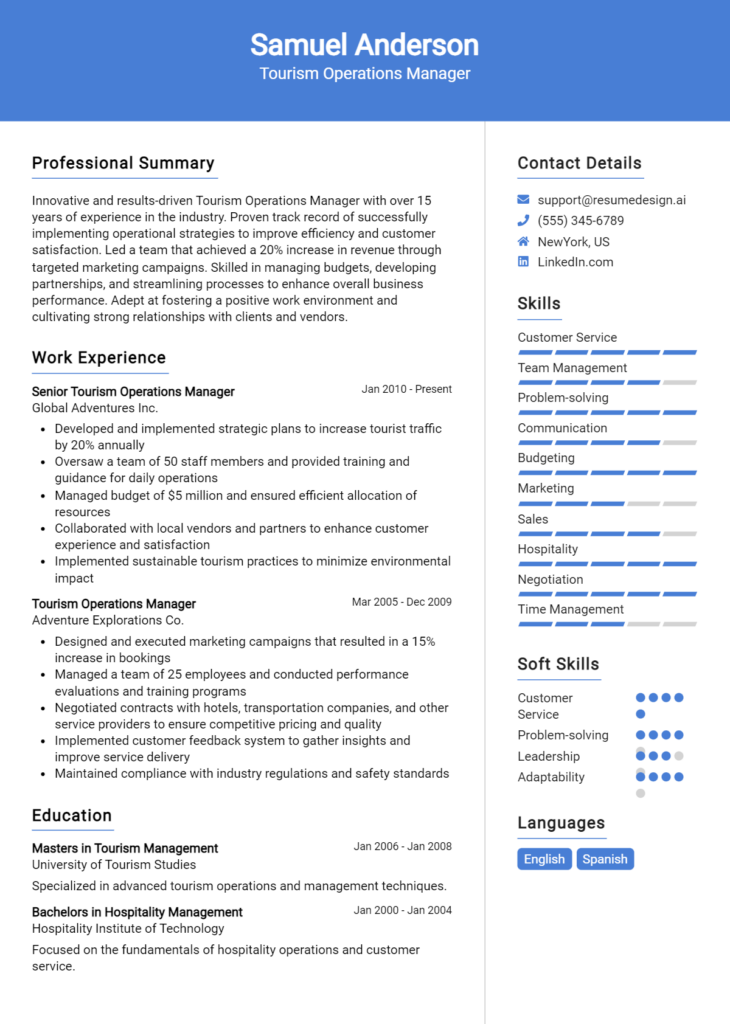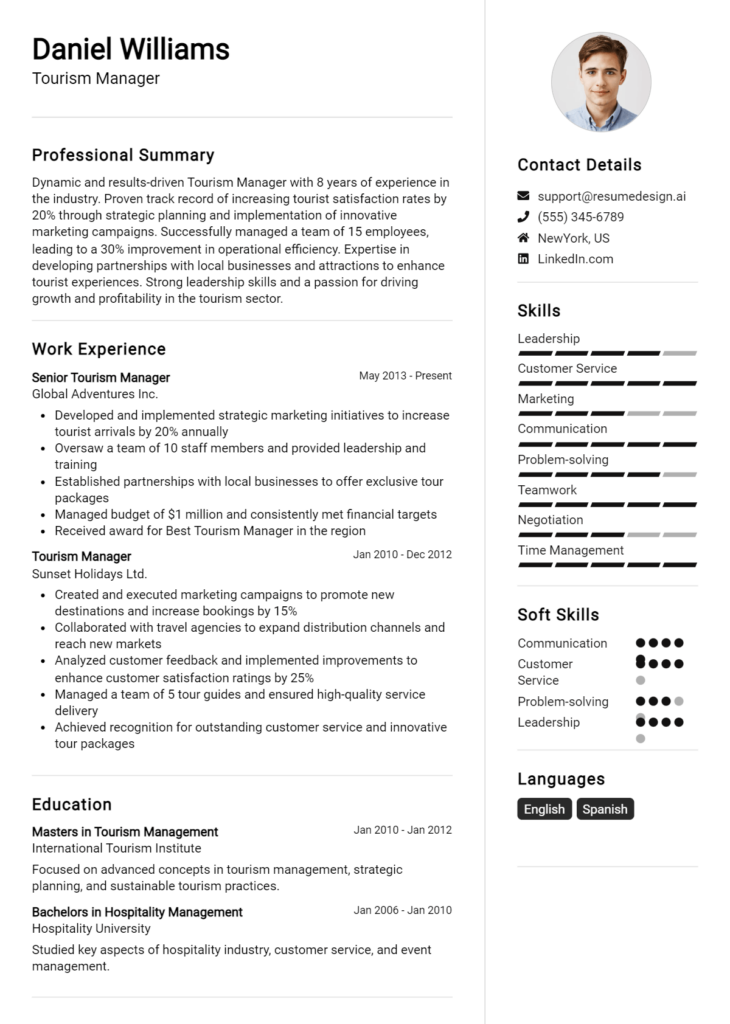Tourism Research Analyst Core Responsibilities
A Tourism Research Analyst plays a crucial role in synthesizing data to inform strategic decisions within the tourism sector. Key responsibilities include analyzing market trends, evaluating tourism impacts, and collaborating with marketing, finance, and operations teams. Essential skills encompass technical proficiency in data analysis tools, operational insight, and strong problem-solving abilities. These competencies not only enhance organizational efficiency but also align with broader business objectives. A well-structured resume showcasing these skills is vital for career advancement.
Common Responsibilities Listed on Tourism Research Analyst Resume
- Conduct market research to identify tourism trends and opportunities.
- Analyze demographic data to guide tourism development initiatives.
- Prepare reports and presentations for stakeholders.
- Collaborate with cross-functional teams on tourism projects.
- Evaluate the effectiveness of marketing campaigns.
- Monitor competitor activities and industry developments.
- Utilize statistical software to analyze large data sets.
- Provide insights to improve customer experiences.
- Assist in the formulation of tourism policies and strategies.
- Develop forecasts to predict future tourism trends.
- Engage with local communities to gather qualitative data.
- Assess the economic impact of tourism initiatives.
High-Level Resume Tips for Tourism Research Analyst Professionals
In today's competitive job market, a well-crafted resume is essential for Tourism Research Analyst professionals looking to make a strong first impression on potential employers. Your resume serves as a snapshot of your skills, experiences, and achievements, often determining whether you advance to the next stage of the hiring process. Since the tourism industry is data-driven and analytical, your resume should not only highlight your technical expertise but also reflect your accomplishments in a way that resonates with hiring managers. This guide will provide practical and actionable resume tips specifically tailored for Tourism Research Analyst professionals, ensuring you stand out in a crowded field.
Top Resume Tips for Tourism Research Analyst Professionals
- Tailor your resume to the job description by incorporating relevant keywords and phrases that reflect the skills and qualifications sought by the employer.
- Highlight your research experience, showcasing specific projects where you analyzed tourism trends, consumer behavior, or market data.
- Quantify your achievements by including metrics, such as percentage increases in tourism revenue or visitor numbers resulting from your analysis.
- Demonstrate proficiency in industry-specific tools and software, such as SPSS, Tableau, or GIS, to showcase your technical skills.
- Include a summary statement at the top of your resume that encapsulates your expertise and highlights your most relevant skills and experiences.
- Showcase your ability to communicate complex data insights through clear and concise reports or presentations that have influenced decision-making.
- List relevant educational qualifications and certifications, such as degrees in tourism management, statistics, or data analytics.
- Incorporate soft skills like critical thinking, problem-solving, and teamwork, which are essential for working effectively in collaborative research environments.
- Utilize a clean and professional format, ensuring your resume is easy to read and visually appealing, which enhances the overall impression.
By implementing these tips, you can significantly increase your chances of landing a job in the Tourism Research Analyst field. A polished and tailored resume not only highlights your qualifications but also demonstrates your understanding of the tourism industry, making you a more attractive candidate to potential employers.
Why Resume Headlines & Titles are Important for Tourism Research Analyst
In the competitive field of tourism research, the role of a Tourism Research Analyst is pivotal in providing insights that inform strategic decisions and enhance travel experiences. A well-crafted resume headline or title serves as the first impression for hiring managers, offering a succinct summary of a candidate's qualifications and aligning them with the specific demands of the role. A strong headline can immediately capture attention, allowing candidates to differentiate themselves in a crowded job market. Therefore, it is essential that the headline is concise, relevant, and tailored to the job being applied for, effectively showcasing the candidate's unique value proposition.
Best Practices for Crafting Resume Headlines for Tourism Research Analyst
- Keep it concise—aim for one impactful sentence.
- Use role-specific keywords to emphasize your expertise.
- Highlight your most relevant skills or experiences.
- Incorporate quantifiable achievements when possible.
- Tailor the headline to the specific job description.
- Avoid vague terms; be specific about your qualifications.
- Utilize action verbs to create a dynamic impression.
- Test different headlines to see which resonates best.
Example Resume Headlines for Tourism Research Analyst
Strong Resume Headlines
Expert Tourism Research Analyst with 7+ Years in Market Trends and Consumer Insights
Data-Driven Tourism Analyst Specializing in Destination Marketing Strategies
Results-Oriented Research Analyst with Proven Track Record in Enhancing Visitor Engagement
Innovative Tourism Research Professional Skilled in Data Analysis and Strategic Planning
Weak Resume Headlines
Tourism Expert
Research Analyst
Highly Motivated Individual
Strong resume headlines are effective because they provide clear, specific insights into a candidate's qualifications, immediately aligning their skills with the needs of the employer. Each strong headline showcases unique strengths and accomplishments, making them stand out. In contrast, weak headlines are vague and generic, failing to communicate any real value or specific expertise. This lack of clarity can leave hiring managers unimpressed and uncertain about the candidate's fit for the role.
Writing an Exceptional Tourism Research Analyst Resume Summary
A resume summary is a crucial component for a Tourism Research Analyst, serving as the first impression that potential employers will have of a candidate. A well-crafted summary quickly captures the attention of hiring managers by succinctly showcasing key skills, relevant experience, and notable accomplishments that align with the job role. It should be concise, impactful, and tailored specifically to the position the candidate is applying for, setting the stage for the rest of the resume and making a compelling case for why the candidate is a strong fit for the role.
Best Practices for Writing a Tourism Research Analyst Resume Summary
- Quantify Achievements: Use specific numbers or percentages to highlight your accomplishments, making your contributions clear and impactful.
- Focus on Relevant Skills: Highlight skills that are directly applicable to the tourism research field, such as data analysis, market research, and report generation.
- Tailor to the Job Description: Customize your summary to reflect the specific qualifications and requirements listed in the job posting.
- Keep it Concise: Aim for 2-4 sentences that deliver a powerful message without overwhelming the reader.
- Use Action Verbs: Start statements with strong action verbs to convey authority and competence.
- Highlight Industry Knowledge: Emphasize your understanding of tourism trends, consumer behavior, and market dynamics.
- Showcase Technical Proficiency: Mention any relevant software or tools you are proficient in, such as statistical analysis programs or data visualization tools.
- Demonstrate Impact: Focus on how your contributions have positively influenced previous employers or projects.
Example Tourism Research Analyst Resume Summaries
Strong Resume Summaries
Results-driven Tourism Research Analyst with over 5 years of experience in data analysis and market research, successfully increasing visitor engagement by 40% through targeted research initiatives. Proficient in utilizing statistical software to drive insights and inform strategic decisions.
Dynamic professional with a proven track record in tourism analytics, achieving a 30% reduction in operational costs by optimizing resource allocation based on extensive market trends analysis. Skilled in presenting complex data in an accessible format for stakeholders.
Highly analytical Tourism Research Analyst with expertise in consumer behavior analysis and a Master’s degree in Tourism Management. Developed comprehensive reports that contributed to a 25% increase in tourism revenue for a leading travel agency.
Weak Resume Summaries
Tourism Research Analyst with experience in data and research. I am looking for a new opportunity in the field.
Dedicated professional seeking a role in tourism research. I have some skills in analysis and reporting.
The examples of strong resume summaries effectively highlight specific achievements, relevant skills, and clear impacts, demonstrating the candidate's value to potential employers. In contrast, the weak summaries lack detail, specificity, and quantifiable outcomes, making them less compelling and memorable. A strong summary not only details experience but also effectively communicates the candidate's unique contributions and readiness for the role, while weak summaries fail to do so, leaving hiring managers unimpressed.
Work Experience Section for Tourism Research Analyst Resume
The work experience section of a Tourism Research Analyst resume is vital in demonstrating a candidate's practical application of skills and knowledge in the tourism industry. This section not only highlights technical expertise in data analysis, market research, and tourism trends but also showcases the candidate's ability to manage teams and collaborate effectively to deliver high-quality results. By quantifying achievements and aligning experiences with industry standards, candidates can provide concrete evidence of their contributions and successes, making their applications more compelling to potential employers.
Best Practices for Tourism Research Analyst Work Experience
- Clearly articulate technical skills, such as proficiency in statistical software, data visualization tools, and research methodologies.
- Quantify achievements with specific metrics, such as revenue growth, increased visitor numbers, or successful research project completions.
- Highlight leadership roles and team management experiences, demonstrating your ability to guide projects and collaborate with diverse groups.
- Align your experiences with industry standards and trends to show relevance and adaptability in a fast-changing field.
- Utilize action verbs to convey your contributions and impact effectively.
- Incorporate feedback from stakeholders to illustrate your ability to create high-quality deliverables that meet client expectations.
- Include interdisciplinary collaboration experiences to demonstrate your ability to work across various sectors within tourism.
- Tailor your experiences to the specific job description to emphasize the most relevant skills and achievements.
Example Work Experiences for Tourism Research Analyst
Strong Experiences
- Led a team of 5 analysts in a comprehensive market research project, resulting in a 30% increase in targeted tourism campaigns and a revenue boost of $500,000.
- Developed a predictive modeling tool that improved visitor forecasting accuracy by 25%, enabling strategic planning for local businesses.
- Collaborated with government agencies and local stakeholders to implement a sustainable tourism initiative, increasing eco-tourist visits by 40% within one year.
Weak Experiences
- Worked on various projects related to tourism research.
- Assisted in data collection and reporting tasks.
- Participated in team meetings to discuss industry trends.
The examples provided illustrate a clear distinction between strong and weak experiences. Strong experiences are characterized by specific metrics and outcomes that demonstrate a clear impact on the organization and the tourism industry. They showcase leadership, collaboration, and technical skills in a concrete manner, making them impressive to potential employers. In contrast, weak experiences lack detail and quantifiable results, making them less compelling and failing to convey the candidate's true capabilities and contributions in the tourism research field.
Education and Certifications Section for Tourism Research Analyst Resume
The education and certifications section of a Tourism Research Analyst resume plays a crucial role in establishing a candidate's qualifications and expertise in the field. This section serves to highlight the individual's academic background, industry-relevant certifications, and commitment to continuous learning, which are essential for understanding the dynamics of the tourism sector. By providing relevant coursework, certifications, and specialized training, candidates can significantly enhance their credibility and demonstrate their alignment with the job role, making them more appealing to potential employers.
Best Practices for Tourism Research Analyst Education and Certifications
- Include degrees that are directly related to tourism, hospitality, or research methodologies.
- List industry-recognized certifications, such as Certified Tourism Ambassador (CTA) or Certified Research Analyst (CRA).
- Highlight relevant coursework that demonstrates analytical skills, data interpretation, or market research.
- Update your certifications regularly to reflect ongoing professional development.
- Use clear and concise language to describe your educational achievements and certifications.
- Order your qualifications in reverse chronological order, starting with the most recent.
- Include any specialized training that pertains to tourism analytics, market trends, or data analysis tools.
- Tailor the education and certifications section to match the specific requirements of the job you are applying for.
Example Education and Certifications for Tourism Research Analyst
Strong Examples
- M.A. in Tourism Management, University of XYZ, 2022
- Certified Research Analyst (CRA), National Association of Research Professionals, 2023
- Relevant Coursework: Advanced Data Analysis in Tourism, Consumer Behavior in Hospitality, and Geographic Information Systems (GIS) for Tourism.
- Certification in Market Research Techniques, International Institute of Market Research, 2021
Weak Examples
- Bachelor's Degree in English Literature, University of ABC, 2010
- Certification in Basic Computer Skills, Community College, 2015
- Relevant Coursework: Introduction to Psychology and Creative Writing.
- Outdated Certification in Travel Agent Skills, Travel Association, 2010
The strong examples are considered effective because they directly relate to the skills and knowledge required for a Tourism Research Analyst position, showcasing advanced education and certifications that reflect current industry standards. Conversely, the weak examples are deemed ineffective as they either lack relevance to the tourism field or are outdated, failing to support the candidate's suitability for the role.
Top Skills & Keywords for Tourism Research Analyst Resume
As a Tourism Research Analyst, showcasing the right skills on your resume is crucial for standing out in a competitive job market. Employers seek professionals who not only possess technical expertise but also demonstrate strong interpersonal qualities. A well-rounded skill set enables you to analyze tourism trends, interpret data effectively, and communicate insights to stakeholders. Highlighting both hard and soft skills can significantly enhance your resume, making it more appealing to potential employers. By strategically incorporating these skills, you can convey your suitability for the role and your ability to contribute positively to the tourism industry.
Top Hard & Soft Skills for Tourism Research Analyst
Soft Skills
- Analytical Thinking
- Communication Skills
- Team Collaboration
- Problem-Solving Abilities
- Adaptability
- Attention to Detail
- Critical Thinking
- Time Management
- Creativity
- Customer Service Orientation
- Interpersonal Skills
- Cultural Awareness
- Conflict Resolution
- Networking Skills
Hard Skills
- Data Analysis
- Statistical Software Proficiency (e.g., SPSS, R)
- Geographic Information Systems (GIS)
- Market Research Techniques
- Survey Design and Implementation
- Report Writing
- Presentation Skills
- Database Management
- Knowledge of Tourism Trends
- Economic Analysis
- Forecasting Models
- Project Management
- Proficiency in Microsoft Excel
- Data Visualization Tools (e.g., Tableau)
- Knowledge of Travel Regulations and Policies
For more insights on how to effectively showcase these skills and highlight your work experience, consider tailoring your resume to reflect your unique qualifications as a Tourism Research Analyst.
Stand Out with a Winning Tourism Research Analyst Cover Letter
As a dedicated and detail-oriented professional with a strong background in tourism research and data analysis, I am excited to apply for the Tourism Research Analyst position. My experience in analyzing trends, consumer behavior, and market dynamics has equipped me with the skills necessary to contribute to your team's success. I am particularly drawn to this role at [Company Name] because of your commitment to enhancing sustainable tourism practices and providing data-driven insights that support decision-making in the industry.
In my previous role at [Previous Company Name], I successfully led several research projects that evaluated tourism patterns and economic impacts in various regions. By utilizing advanced analytical tools and methodologies, I was able to deliver actionable insights that informed marketing strategies and policy recommendations. My proficiency in statistical analysis software, combined with my ability to synthesize complex data into clear and compelling reports, has been instrumental in helping stakeholders understand the implications of key trends in tourism.
Furthermore, my strong communication skills allow me to effectively present findings to a diverse audience, from industry professionals to community stakeholders. I am adept at crafting presentations and reports that not only highlight critical data but also tell a compelling story about the future of tourism. I am particularly passionate about using research to advocate for sustainable practices that benefit both the economy and the environment, aligning closely with [Company Name]'s mission.
I am eager to bring my expertise in tourism research and analysis to [Company Name] and contribute to your ongoing efforts to foster a vibrant and sustainable tourism landscape. Thank you for considering my application. I look forward to the opportunity to discuss how my qualifications and enthusiasm for this field can add value to your team.
Common Mistakes to Avoid in a Tourism Research Analyst Resume
When applying for the role of a Tourism Research Analyst, crafting a compelling resume is essential to stand out in a competitive field. However, many candidates make common mistakes that can detract from their qualifications and experiences. Avoiding these pitfalls can significantly enhance the effectiveness of your resume and increase your chances of landing an interview. Here are some prevalent mistakes to be mindful of:
Using a Generic Template: Many applicants rely on one-size-fits-all templates, which can make their resumes blend in with others. Tailoring your resume to highlight relevant skills and experiences specific to tourism research is crucial.
Lacking Quantifiable Achievements: Failing to include measurable accomplishments can weaken your resume. Instead of simply listing duties, showcase how your contributions led to specific outcomes, such as increased visitor satisfaction or improved research methodologies.
Overloading with Jargon: While industry-specific terminology is important, overloading your resume with jargon can alienate hiring managers. Strive for clarity and ensure that your skills and experiences are easily understood.
Ignoring Relevant Skills: Tourism Research Analysts should possess a unique blend of analytical and interpersonal skills. Omitting key skills like data analysis, market research, and communication can lead to missed opportunities.
Neglecting Formatting: A cluttered or unprofessional layout can make your resume difficult to read. Stick to clear headings, bullet points, and consistent formatting to enhance readability.
Failing to Customize for Each Application: Sending out the same resume for every job application can be detrimental. Take the time to tailor your resume to match the specific requirements and preferences listed in each job description.
Not Proofreading: Typos and grammatical errors can create a negative impression and suggest a lack of attention to detail. Always proofread your resume or have someone else review it before submission.
Omitting Professional Development: In a dynamic field like tourism research, it’s important to showcase ongoing professional development. Failing to include relevant certifications, workshops, or courses can make you appear less committed to your career growth.
Conclusion
As we have explored the essential skills and responsibilities of a Tourism Research Analyst, it is clear that this role requires a unique combination of analytical prowess, market insight, and an understanding of consumer behavior. From interpreting data trends to providing actionable recommendations for tourism stakeholders, the impact of a skilled analyst can significantly enhance the effectiveness of tourism strategies.
In summary, key points to consider include:
- Data Analysis: Proficiency in statistical tools and methodologies to analyze tourism trends.
- Market Research: The ability to conduct surveys and gather data to understand tourist preferences and behaviors.
- Report Writing: Strong skills in presenting research findings in a clear and compelling manner.
- Collaboration: Working effectively with various stakeholders, including government agencies, tourism boards, and private sector partners.
To stand out in the competitive field of tourism research, it’s essential to ensure that your resume accurately reflects your skills and experience. Take a moment to review your Tourism Research Analyst resume and consider utilizing resources that can help enhance its quality.
Explore a variety of resume templates designed to meet industry standards, or use our resume builder for a personalized touch. If you’re looking for inspiration, browse through our collection of resume examples tailored for tourism research roles. Additionally, don't forget to check out our cover letter templates to complement your application and make a strong impression.
Take action today to elevate your resume and secure your next opportunity in the vibrant field of tourism research!

